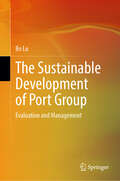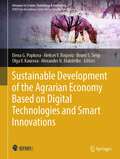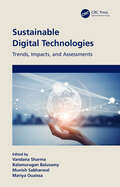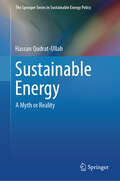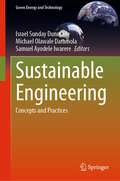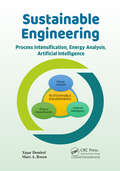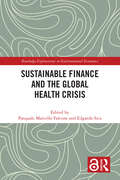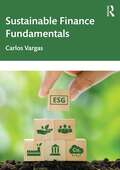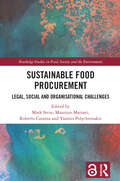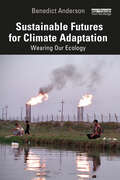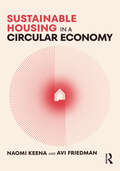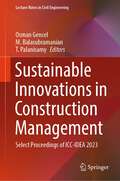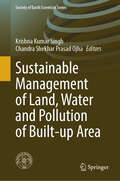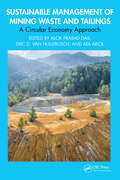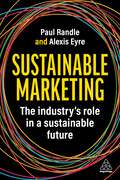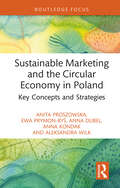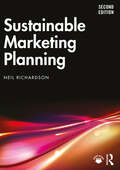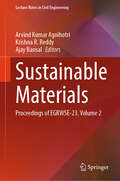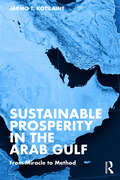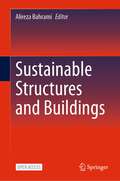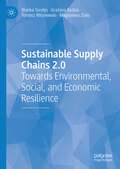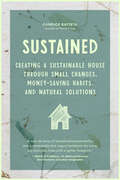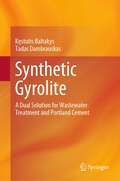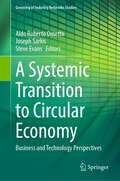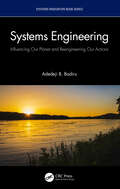- Table View
- List View
The Sustainable Development of Port Group: Evaluation and Management
by Bo LuThis book primarily focuses on the coordinated development of port groups and the environment. It extensively reviews relevant literature and draw on existing theoretical research achievements to analyze the mechanisms and influencing factors behind the formation of green, ecological, or energy-saving ports. It employs attribution decomposition analysis and LMDI decomposition methods to identify driving forces and factors for low-carbon ports. Furthermore, with the goal of minimizing the comprehensive cost of low-carbon port investment and considering constraints such as the upper limit of low-carbon investment in ports, the book utilizes tools such as stochastic processes and optimization decision theory to establish an optimization model for carbon emission reduction investment in low-carbon ports, aiming to find the best investment solution. Throughout the process, the book employs a combination of quantitative and qualitative analysis methods and provides corresponding recommendations and suggestions from an industry and port perspective through comparative analysis and case studies.
Sustainable Development of the Agrarian Economy Based on Digital Technologies and Smart Innovations (Advances in Science, Technology & Innovation)
by Elena G. Popkova Aleksei V. Bogoviz Bruno S. Sergi Olga V. Kaurova Alexander N. MaloletkoThis book elaborates on the modern experience and prospects and the development of recommendations for sustainable development of the agrarian economy based on digital technologies and smart innovations for the provision of food security. This book dwells on the global and regional challenges for food security and answers to them through the sustainable development of the agrarian economy. The book also studies the international experience of sustainable development of the agrarian economy on the basis of digital technologies and advantages for food security. Sustainable development of the agrarian economy with the use of digital technologies—as the foundation of food security of Central Asia—is considered. The prospects for provision of food security through the use of smart innovations for the sustainable development of the agrarian economy are outlined. A set of applied recommendations for raising the effectiveness of the use of smart innovations for the sustainable development of the agrarian economy is proposed.
Sustainable Digital Technologies: Trends, Impacts, and Assessments
by Vandana Sharma, Balamurugan Balusamy, Munish Sabharwal, and Mariya OuaissaThis book is a reference on digital technology and its impact on sustainability, providing insight into sustainable practices globally. It focuses on the critical practices leading to sustainable initiatives among various organizations, IT infrastructure, communities, and government compliance. The book describes the green computing paradigms and the impact of a circular economy with a focus on sustainable practices in a post-pandemic world. Sustainable Digital Technologies: Trends, Impacts, and Assessments discusses the critical factors leading to sustainable initiatives in a global economy. It highlights the impact of digital technology and Industry 4.0 in today’s world. The book focuses on the role, responsibility, and the effect of the Internet of Things for digital sustainability and practices. It describes implementation strategies for green cloud computing and presents additional strategies for sustainable practices in a post-pandemic world. This publication is designed for use by technology development academicians, data scientists, industrial professionals, researchers, and students interested in uncovering the latest innovations in the field and the current research on problem-oriented processing techniques in sustainable and evolutionary computing applications with reduced energy channelization.
Sustainable Energy: A Myth or Reality (The Springer Series in Sustainable Energy Policy)
by Hassan Qudrat-UllahThis book embarks on a transformative journey through the complex landscape of renewable energy, challenging prevailing myths and uncovering the realities that define our energy future. At the heart of this exploration lies the dynamic intersection of technology and sustainability, spotlighting the critical nexus where innovation meets eco-conscious solutions. Far from a mere debunking exercise, this book unfolds as a comprehensive narrative, weaving through the complex tapestry of challenges and opportunities that define the sustainable energy paradigm. Unravelling misconceptions surrounding sustainable energy, the book places a particular emphasis on renewable sources like solar and wind, providing a profound understanding that extends beyond the surface. Engaging case studies and examples punctuate the narrative, offering a firsthand glimpse into the practical applications and challenges of sustainable energy projects. Designed for a diverse readership, the book speaks to: (i) Students and teachers: Delving into the scientific and technical intricacies of sustainable energy sources, along with their broader environmental, social, and economic impacts. (ii) Researchers and professionals: Offering an up-to-the-minute guide to the latest developments and trends in the ever-evolving field of sustainable energy. (iii) Policy makers and activists: Providing a nuanced exploration of the facts and evidence underpinning sustainable energy, alongside an insightful examination of the myths and misconceptions that surround it. (iv) General readers: Inviting all who seek to broaden their knowledge and awareness of sustainable energy, understanding its profound relevance and importance for the collective future of humanity and the planet. This book isn't just a journey; it's a call to action. As you turn the pages, you're not only gaining knowledge but becoming part of a movement toward a resilient and eco-friendly tomorrow. Embrace the future of energy – informed, inspired, and empowered.
Sustainable Engineering: Concepts and Practices (Green Energy and Technology)
by Israel Sunday Dunmade Michael Olawale Daramola Samuel Ayodele IwarereSustainable Engineering: Concepts and Practices provides insights into current perspectives on sustainable engineering research. It highlights the drivers, motivations, and challenges affecting the development and adoption of sustainable engineering in various sectors of the economy and how they impact sustainable development. Contributions from researchers representing multiple branches of engineering in academia, government laboratories, and industry present alternative approaches to traditional engineering practices. These approaches effect change, making the design, construction, production, and management of products, processes, and systems more environmentally friendly, socially beneficial, and economically profitable. The book will be a trusted reference for graduate students, practicing engineers, and other professionals interested in developing or using sustainable products and systems.
Sustainable Engineering: Process Intensification, Energy Analysis, and Artificial Intelligence
by Yasar Demirel Marc A. RosenSustainable engineering is of great importance for resilient and agile technology and society. This book balances economics, environment, and societal elements of sustainable engineering by integrating process intensification, energy analysis, and artificial intelligence to reduce production costs, improve the use of material and energy, product quality, safety, societal well-being, and water usage. The book provides comprehensive discussion of topics on process intensification, energy analysis, and artificial intelligence that include optimization, energy integration, green engineering, pinch analysis, exergy analysis, feasibility analysis, life cycle assessment, circular economy, bioeconomy, data processing, machine learning, expert systems, digital twins, and self-optimized plants for sustainable engineering.
Sustainable Finance and the Global Health Crisis (Routledge Explorations in Environmental Economics)
by Pasquale Marcello Falcone Edgardo SicaThe speed with which the various economies recover from the Covid-19 pandemic will significantly determine the economic pressure placed on the environment in the medium-to-long-term. Furthermore, the pandemic has highlighted the strong interrelations between natural and societal systems, with societal resilience depending on a resilient environmental support system. In this context, the book argues that the pandemic represents a wake-up call for financial systems to be better prepared for the climate crisis and social risk, and has provided a stimulus to scale down the reliance of the global economy on fossil fuels. The first part of the book provides a deep and creative discussion between leading international researchers and experts on the policy options and financial instruments which can help to catalyze the green finance transition in the post-Covid-19 era. The contributions show that sustainable finance is emerging as a powerful tool to advance the transition towards a more environmentally and socially sustainable economic model. Instruments such as sovereign green bonds, green securities, and other sustainability-related securities can play a significant role in the post-Covid-19 world to fund economic stimulus and to lead the way to new and more sustainable future. The second part of the book supports the debate by highlighting a number of selected case studies on financing transitions in different regional contexts including Africa, Asia, Europe, and Latin America. The book marks a significant contribution to the literature on environmental economics and finance, climate change, and sustainability transitions.
Sustainable Finance Fundamentals
by Carlos VargasSustainable Finance Fundamentals provides an accessible overview of this critical, rapidly growing area at the intersection of finance and sustainability. The first part showcases different approaches to sustainable finance, covering banking, impact investing, integrated reporting and strategy, and risk management. The second part covers investing, including equity, green bonds, and crowdfunding. In the final part, issues beyond sustainable finance, such as alternative investments, renewable energy, and innovation, are explored. In addition, two optional appendices provide useful introductions to the time value of money (TVM) and financial statements. Ethical and regulatory issues are addressed holistically throughout the book and sustainable finance is linked to related topics, such as environmental economics and the UN Sustainable Development Goals. Each chapter has an international focus and features examples, "in a nutshell" summaries, and discussion questions. Whether you are a student or professional, Sustainable Finance Fundamentals is essential reading for anyone looking to gain a comprehensive understanding of sustainable finance, impact investing, and related areas. Lecture slides and teaching notes are also available for instructors, making this book an ideal text for courses on sustainable finance.
Sustainable Food Procurement: Legal, Social and Organisational Challenges (Routledge Studies in Food, Society and the Environment)
by Mark Stein Maurizio Mariani Roberto Caranta Yiannis PolychronakisThe book examines sustainable food procurement policy and practice in the European Union and beyond, exploring the extent to which sustainability objectives have been achieved and evaluating the new developments taking place at both EU and national levels.While there is a growing recognition that public authorities can use public procurement as a policy tool to pursue multiple environmental, health and socio-economic objectives, contracting authorities still face many challenges. This volume investigates the scope for pursuing sustainable objectives in public procurement of food and catering services, examining different regulatory contexts and organisational models to answer the overall question of how to integrate sustainability concerns into the various phases of public food procurement processes. Contributions in the book examine the policy and legal procurement framework and practices for sustainable public catering in three EU Member States: Italy, France and Spain. There is a comparative survey of the Baltic Region, including Denmark, Estonia, Finland, Poland and Russia, and moving beyond the EU, there is examination of the UK and Brazil, as well as a cross country comparison of the UK with Denmark and Sweden. Drawing on the expertise of an interdisciplinary and intersectoral team of contributors allows the book to benefit from the insights of different disciplines, including business sciences, anthropology and law. Tapping into the global discussion on public food procurement as a means to achieve multiple social and environmental goals, this work will stimulate readers looking for new creative ways to create value through public food purchasing.This book will be of great interest to students, researchers, policymakers and public- and private-sector representatives interested in public procurement, food policy and law, sustainable food sourcing and supply chain management.
Sustainable Futures for Climate Adaptation: Wearing Our Ecology
by Benedict AndersonConsidering sustainability as a flawed and restrictive term in practice, Sustainable Futures for Climate Adaptation argues that we must radically adapt humanity and reform society, cities, buildings, and our approach to migration in order to coexist in harmony with our natural environments. The book conceives an Earth–human coexistence where the world’s regions are shared globally between all people, in contrast to a reality where we have lost touch with the natural world. It is this decoupling of humanity and nature that has brought us to the brink of climate disaster. In response, Benedict Anderson explores the concept of ‘wearing our ecology’, where human mobility is synchronized with the environment, merging people with landscapes, topographies, and geographies. Anderson argues that we need to create new migration routes for people moving between the Global South and North and establish flexible and adaptive living environments. Only by rethinking separations between urban and rural, resource extraction and consumption, racial prejudice and accessibility are we able to forge a closer partnership with nature to adapt to climate change and mitigate the worst of its effects. Touching on themes of adaptive urban design, racial and gender segregation and inequality, and climate apocalypticism, this book will be valuable reading for researchers, scholars, and upper-level students in the fields of urban studies, migration studies, human geography, ecology, politics, and design.
Sustainable Housing in a Circular Economy
by Naomi Keena Avi FriedmanThis book relates circular economy principles to housing design and construction and highlights how those principles can result in both monetary savings, positive environmental impact, and socio-ecological change.Chapters focus on three key circular economy principles and apply them to architectural construction and design, namely rethinking of the end-of-use phase of a building and the potential of design-for-disassembly; the role of digitization and data standardization in fostering evidence-based circular economy design decision-making; and presenting space as a resource to conserve, via exploration of the sharing economy and flexibility principles. Beyond waste management and material cycles, this book provides a holistic understanding of the opportunities across the building life cycle that can allow for sustainable and affordable circular housing. With case studies from 13 different countries, including but not limited to the Hammarby Sjöstad district in Sweden, the Circle House in Denmark, Benny Farm in Canada, VMD Prefabricated House in Mexico, and the Deep Performance Dwelling in China, authors pair theoretical frameworks with real-world examples.This will be a useful resource for upper-level students and academics of architecture, construction, and planning, especially those studying and researching housing design, building technology, green project management, and environmental design.
Sustainable Innovations in Construction Management: Select Proceedings of ICC-IDEA 2023 (Lecture Notes in Civil Engineering #388)
by Osman Gencel M. Balasubramanian T. PalanisamyThis book presents the select proceedings of International Conference on Civil Engineering: Innovative Development in Engineering Advances (ICC IDEA 2023). This book covers the latest research in the areas of construction engineering and management, urban planning and design, building energy conservation and green architecture, materials science and engineering, innovation in construction materials, and information technology in civil engineering. The book is useful for researchers and professionals in civil engineering.
Sustainable Management of Land, Water and Pollution of Built-up Area (Society of Earth Scientists Series)
by Chandra Shekhar Prasad Ojha Krishna Kumar SinghThis edited book is a comprehensive and forward-thinking exploration of the challenges and opportunities in building environmentally resilient and thriving cities. In a rapidly urbanizing world, the management of land, water, and pollution within built-up areas is a critical issue, and this book presents a wealth of knowledge to address it. It showcases a range of case studies and real-world applications that illustrate successful strategies and innovative solutions for urban sustainability. These practical examples offer valuable insights for urban planners, policymakers, and environmental practitioners.The book delves into cutting-edge research and visionary solutions. It goes beyond conventional approaches to explore emerging technologies and futuristic concepts, positioning itself at the forefront of urban sustainability. Readers will discover innovative ideas that can shape the future of urban development, making cities more livable, sustainable, and resilient.
Sustainable Management of Mining Waste and Tailings: A Circular Economy Approach
by Eric D. van Hullebusch Alok Prasad Das Ata AkçilIntegrating waste management, environmental sustainability, and economic development is a prime milestone in the circular economy. Critical metals recovery from mining tailings and secondary resources has significant potential, with widespread applications in high-tech industries that are critical to modern society and sustainable development. This book discusses technological advances for managing industrial and mining waste through circular economy approaches and successful critical metal recovery from secondary resources. It highlights how reprocessing of mine waste and tailings results in development of critical raw materials that significantly reduce the mining burden and ensure the lucrative use of waste materials.Features: Describes advances in remediation and valorization technologies for mining wastes Details biotechnological methods, cutting edge research, and applications Covers use of waste mining resources for economic growth and novel opportunities Discusses IR4.0 and machine learning methods Includes reports and case studies on mining waste in value-added products and recovery of strategically important critical minerals This book will be of value to researchers and advanced students working in the mining, chemical and environmental engineering, and renewable energy sectors.
Sustainable Marketing: The Industry’s Role in a Sustainable Future
by Paul Randle Alexis EyreBecoming a sustainable marketer is no longer an optional extra. Sustainability has become a necessity for the future, but do you feel confident delivering on this for your clients and customers?Sustainable Marketing is a blueprint for embedding sustainability at the heart of marketing. Exposing the disturbing reality of marketing's current relationship with many of our environmental and societal problems, it challenges the traditional role of marketing, its cultural norms and gross inefficiency. It goes on to present a compelling vision for change and a practical guide for marketing professionals, equipping them with the mindset and tools to transform their daily work and the industry as a whole, into a force for good.This is the perfect guide for marketing and sustainability professionals working through their company's sustainable transformation whilst trying to avoid the pitfalls of greenwashing and carbon myopia. Written by experts who apply their unique framework to the issue, this book takes what may feel like an insurmountable challenge and breaks it down, giving in-depth advice and providing real-world success stories from companies of all sizes including Tony's Chocolonely, The Onlii and AkzoNobel.
Sustainable Marketing and the Circular Economy in Poland: Key Concepts and Strategies (Routledge Focus on Environment and Sustainability)
by Anita Proszowska Ewa Prymon-Ryś Anna Dubel Anna Kondak Aleksandra WilkSustainable Marketing and the Circular Economy in Poland outlines the specific challenges around formulating an organisation's marketing strategy in line with the circular economy (CE) framework.This book helps to solve the problem of ineffective pro-environmental programmes and marketing tools, which are currently used by enterprises to make their activities more sustainable. The authors identify key concepts and strategies of sustainable marketing to highlight the trends and development directions of marketing activities of modern enterprises. Focussing on Poland as a central case study, the book is illustrated with examples of organisations that are implementing sustainable marketing activities that are compatible with the CE model. It also presents the results of studies which examined the pro-environmental marketing efforts of small- and medium-sized enterprises, non-governmental organisations and other actors in Poland. To conclude, the authors put forward recommendations for CE network stakeholders regarding sustainable marketing management, focussing specifically on how to avoid accusations of greenwashing and other unethical organisational behaviour.This book will be of great interest to students and scholars of green marketing, sustainable business and the CE, as well as entrepreneurs and business professionals looking to formulate sustainable marketing strategies.
Sustainable Marketing Planning
by Neil RichardsonThis book provides practical insights, tools and frameworks to help readers produce tactically and strategically appropriate marketing plans.Showing how to embed sustainability in these plans, students will be shown how to implement changes while being encouraged to reflect on why they are needed. The text reflects on contemporary themes that impact on sustainable marketing planning, including consumer behaviour, entrepreneurialism, internal marketing, services, international marketing, event management and digital marketing. The second edition has been fully updated with a greater focus on the issues surrounding sustainability, including the environmental challenges facing businesses, sustainable accreditation and integrating the UN SDGs. It provides background on the value discourses that underpin sustainability, incorporates new examples and case studies from broader regions around the world and introduces TBL-based loyalty. Full of tools and frameworks to improve comprehension, including chapter-by-chapter learning outcomes, summaries, exercises, applied activities and mini case studies, it bridges the gap between theory and practice effectively and accessibly.Presenting contemporary themes and challenges at the cutting edge of business research and practice, this book provides core reading for advanced undergraduate and postgraduate students of sustainable marketing, marketing planning and marketing strategy, as well as professionals seeking to improve the competitive advantage of their organisations.Online resources for the use of instructors include PowerPoint lecture slides and a multiple choice questions section.
Sustainable Materials: Proceedings of EGRWSE-23, Volume 2 (Lecture Notes in Civil Engineering #509)
by Krishna R. Reddy Arvind Kumar Agnihotri Ajay BansalThis book contains peer-reviewed and selected papers presented during the International Conference on Environmental Geotechnology, Recycled Waste Materials and Sustainable Engineering (EGRWSE) 2023, held at NIT Jalandhar. It discusses the recent innovations, trends, concerns, practical challenges encountered, and the solutions adopted in waste management and engineering, geotechnical and geoenvironmental engineering, infrastructure engineering and sustainable engineering. This book can serve as a useful resource for researchers, educators, policymakers, and professionals working in the field of civil engineering, chemical engineering, environmental sciences, and public policy.
Sustainable Prosperity in the Arab Gulf: From Miracle to Method
by Jarmo T. KotilaineTracing the development journey of the Arabian Gulf region with a forward-looking perspective, this book describes how a combination of good fortune, creative experimentation, and determination has enabled the region to achieve prosperity. Today, the Arabian Gulf is well positioned to assume a pivotal role in the new global order. Forced to balance an extreme climate and acute resource constraints, but also an exceptional location, the region’s progress and prosperity have historically been precarious and vulnerable to external shocks. Efforts to transcend resource dependency have typically involved proactive attempts to enable other economic activities. This book argues that, while conventional economic diversification is making headway, the Gulf region is in fact amidst a far more holistic transformation that positions it for a pivotal role in the emerging multipolar global order. It now offers globally competitive regulations and world-class infrastructure at the heart of the Old World, flanked by two fast-growing continents. It has become the hub of choice for a growing share of inter-continental flows of people, trade, and capital, and has established strong economic ties in all directions. This book shows how, despite many risks and challenges, the region possesses the forward-looking vision and necessary resilience that can finally liberate it from its long-standing "resource curse" and a development paradigm that looks likely to provide the foundation for sustained well-being in the decades ahead. The scope and rigor of the book make it suitable as a reference on the Arabian Gulf and for those interested in global affairs and economic development, as well as policymakers and the business community.
Sustainable Structures and Buildings
by Alireza BahramiThis open access book includes detail on various structures, buildings, and building materials from different structural and sustainability perspectives. It describes how the building industry is vital for the achievement of the sustainable development goals, namely, economic growth, social progress, and the effective protection of the environment. The aim of this collection is to foster the design and construction of sustainable structures and buildings to reduce the environmental load, connect with the environment, and benefit the health of occupants. Presenting the knowledge, trends, and developments from a group of contributors in the field working with different kinds of structures, structural components, buildings, and building materials, the book is ideal for practitioners working in commercial settings, as well as engineering students and researchers concerned with sustainability issues.
Sustainable Supply Chains 2.0: Towards Environmental, Social, and Economic Resilience
by Blanka Tundys Grażyna Kędzia Tomasz Wiśniewski Magdalena ZiołoSustainable supply chains are one of the development trends of modern business strategies. They are a response to economic challenges and trends, while at the same time being a creator of value and competitive advantage. This book identifies environmental, social, and economic issues not only as the basis for configuring a sustainable supply chain, but also as important determinants of supply chain resilience. By presenting a new model, Sustainable Supply Chain 2.0, this book combines academic theory with practical demonstration on how to build resilient supply chains that implement the principles of sustainable development. It will be of great interest to students of management, supply chain and logistics studies, as well as researchers in the field and business practitioners, including supply chain managers.
Sustained: Creating a Sustainable House Through Small Changes, Money-Saving Habits, and Natural Solutions
by Candice BatistaHelp Save Our Planet with Money-Saving Sustainable Tips for Your HouseHouseholds are among the biggest contributors to global greenhouse gas emissions worldwide. Could the secrets of saving the environment (and money) be closer to home than we thought?Looking for easy, budget-friendly ways to reduce your environmental impact and save money? Authored by award-winning environmental journalist, Candice Batista, Sustained takes you on an eye-opening journey towards sustainability and eco-friendly living─starting at home. This step-by-step, eco-living guide offers simple yet powerful ways to turn each room in your home into a hub of sustainability, while pocketing impressive savings every step of the way.Small changes, big impact. Starting with a deep dive into how our actions at home impact the planet, Sustained offers a practical suite of never-before-seen tools and solutions to initiate the shift towards a greener lifestyle–without draining your time, energy, or budget.Inside find:Eye-Opening Ideas: Explore green cleaning alternatives, ethical fashion brand recommendations, kitchen composting and waste management advice, laundry routine overhaul guidance, and more.Cleaner and Greener: Reduce your dependence on chemical products and single-use plastics, decipher cryptic food and fashion labels, shop like an eco-pro, and make room for a new lifestyle that’s kinder to you, your pocket, and the planet.Eco-Living Simplified: Going green doesn’t have to push your bank account into the red. Uncover tried-and-trusted tips for sustainable living, fresh recipe ideas, and up-to-date insights into top-rated biodegradable home products.Environmentally conscious readers of sustainability books like Simply Living Well, The Backyard Homestead Bible, or Sustainable Minimalism, will love Candice Batista's Sustained.
Synthetic Gyrolite: A Dual Solution for Wastewater Treatment and Portland Cement
by Kęstutis Baltakys Tadas DambrauskasThis book explores the topic of gyrolite and calcium silicate hydrates, focusing on their potential applications in wastewater purification and as additives in ordinary Portland cement. Divided into five chapters, the book provides a comprehensive description of calcium silicate hydrates and addresses challenges in reusing solid waste. It also covers the synthesis and application of gyrolite, offering technological recommendations for future studies. The results presented are supported by instrumental analysis techniques and thermodynamic calculations, allowing readers to delve into inorganic chemistry and materials characterization. The book is suitable for both researchers and students interested in chemistry and materials characterization, offering valuable insights and guidance in the field.
A Systemic Transition to Circular Economy: Business and Technology Perspectives (Greening of Industry Networks Studies #12)
by Aldo Roberto Ometto Joseph Sarkis Steve EvansThe book will explore, using multiple perspectives from multiple contributors, two main aspects for circular economy (CE) business and technology (B&T): systems and value perspectives. Going beyond a linear-economic perspective--the traditional perspective--CE needs to develop intentional and integrated paths to help restore physical resources and regenerate the functions of natural and anthropic systems, creating greater economic and social opportunities, with environmentally positive outcomes. Whether this is feasible and possible within the context of CE and B&T is something that will be central to the contributions made in this book. A major objective of the book is to deliver practical and fundamental knowledge of B&T CE insights combining a systems perspective and value creation for socio-technical innovation leading to sustainable transitions and effective transformations. Based on those key aspects, the book is structured in two parts, one from a more theoretical and conceptual basis in Part 1, and a more applied perspective in Part 2. The chapters in Part 1 are presented through the lens of business and systems transitions. In Part 2, the chapters present the opportunities and the journeys from real case studies of companies engaged in circular business strategies, processes, practices, and technologies.
Systems Engineering: Influencing Our Planet and Reengineering Our Actions (Systems Innovation Book Series)
by Adedeji B. BadiruPeople want to create a better world and planet; however, where, and how to start remains the question. Systems Engineering’s problem-solving methodology can help with its ability to answer multiple questions along with connecting actions and impacts. This book uses the Systems Engineering problem-solving methodology to frame how each answer impacts the planet when multiple actions are strung together no matter where they take place. Systems Engineering: Influencing Our Planet and Reengineering Our Actions illustrates a hierarchical Systems Engineering view of the world with each individual in mind as a link in the chain. It uses an Industrial Engineering framework for action implementations and identifies humans’ interconnected actions. The book discusses the implementation of the Systems Engineering problem-solving methodology and leverages existing concepts of environmental sustainability. A template is present for personal actions for environment social responsibility using a Systems Engineering problem-solving approach and focuses on the foundational use of the trademarked DEJI Systems Model® for action design, evaluation, justification, and integration. This book is a perfect read for all academic disciplines and all engineering fields, as well as business and management fields. It reminds us of the Environmental Foundation of NAE’s 14 Grand Challenges and the part we can play.
